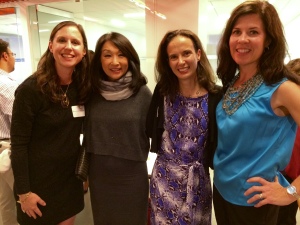Earlier this week, we attended the very first #nycmerrillmeetup, a networking event for University of Maryland Merrill College of Journalism alumni based in the NYC area. I actually helped plan the gathering over the last few months with fellow grads Adam Ostrow of Mashable and Jay Kernis of CBS Sunday Morning. I was thrilled to reconnect with my alma mater and network with more than 70 people who graduated over the last 40 years. Following a somewhat frenzied speed networking exercise, we sat down to hear from Dean Lucy Dalglish and professor/Washington Post reporter Dana Priest, whose focus is on national security coverage.

Here are six key takeaways on the state of journalism education:
- Journalism and Computer Science worlds are colliding. Computer science faculty are helping students understand the role of data and data visualization (read: infographics, animated video, etc.) in reporting news.
- Students are learning about and addressing the risks of their profession. From imprisonment to beheading, the dangers of pursuing a story in a war-torn area are very real. In Priest’s class, each student is assigned an imprisoned journalist to profile and follow. The students are also planning to make and sell bracelets with their names to raise money for the Committee to Protect Journalists.
- A woman in journalism can “have it all,” but it’s not easy. Connie Chung (class of ’69) told the crowd that she got so wrapped up in her career that she “forgot to get married and have children” until her late 40s. Priest talked about the importance of having an understanding spouse (preferably not a journalist) and the willingness to blur the lines between personal and professional. She shared a story about taking a call from an Army General on a Saturday morning while bouncing her toddler in her lap.
- We must understand the business to survive. Given the challenges faced by the industry, it’s no longer okay to focus on the pure craft of reporting news. You have to understand the economics of media/publishing and the role your content plays in your employer’s financial viability.
- The pendulum is swinging back, refocusing us on the fundamentals. There was talk of how the sweeping changes in the industry have started to settle into a new normal. Priest pointed to a renewed appreciation for long-form and investigative journalism.
- Journalists covering politics have to work harder than ever to cultivate sources they can identify. Government officials are more reluctant than ever to speak to journalists given the punitive actions they may face. Sources are increasingly asking to speak “on background” only, which makes it hard for journalists to verify and cover controversial stories. In fact, Dana Milbank of The Washington Post just wrote about an event at the National Press Club that was entirely “off the record.” At the National PRESS Club.
What do you think students should know about a career in the field of journalism?
